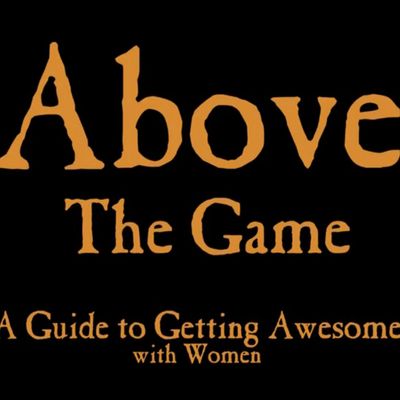
Aspiring dating-advice writer Ken Hoinsky felt the wrath of the feminist blogosphere last week after word got out that Hoinsky, a prolific Redditor, was using Kickstarter to self-publish a book of questionable pickup advice. Called Above the Game: A Guide to Getting Awesome With Women, it was based on his work as the moderator of Reddit’s seduction board. “Pull out your cock and put her hand on it,” went one section, deemed a “rape manual” by some. “Don’t ask for permission, GRAB HER HAND, and put it right on your dick.” Despite the protests and petitions, Hoinsky’s project met its fund-raising goal (and then some), but Kickstarter apologized for allowing it to happen, made a donation to RAINN, and banned all future “seduction guides” from the network, citing their promotion of misogyny.
The outrage seemed to have abated, but because the Internet’s appetite for backlash can sustain backlashes to backlash, Awl writer Maria Bustillos yesterday came after the “whining,” “disingenuous” “virtual Mutaween” that she believes took Hoinsky’s dick-touching advice out of context. (Personally, I don’t think it gains any nuance in the full text.) Bustillos rose to Hoinsky’s defense in the name of a Katie Roiphe–style commitment to passion — “by definition a little wild, uncontrolled” — and to free speech. “It is wrong and dangerous to suggest that shutting someone up is the best answer to any problem, ever,” she wrote. And now I’d like to defend the angry mob.
To be fair, Hoinsky is not technically the rape advocate some of his detractors made him out to be. He knows all about consent, advising men, “If she says ‘STOP,’ or ‘GET AWAY FROM ME,’ or shoves you away, you know she is not interested. It happens.” It’s what comes next that’s still a problem: “If a woman isn’t comfortable, take a break and try again later.” Bustillos endorsed the try, try again strategy in a published conversation with Hoinsky, because some women who say “no” may mean “later,” may be playing hard to get. (Pride and Prejudice is implicated.)
Ken: [Many of my ideas come] from cognitive behavioral therapy. The idea is that taking small steps to put yourself outside of your comfort zone, and building up an understanding of okay, rejection’s going to happen, [and learning] to move forward until it is absolutely clear.
Maria: I’m going to part company with you here, because to me if it’s someone for whom the door might be open later, then you might just say like oh god, and dither and be no no no, or like, whoa! But if it’s really no, then you say it right away, forcefully. If it’s really maybe, then no might sound more maybeish? Does that seem right to you?
Ken: It definitely seems right. And it definitely is pretty common. This is why I tell them, when that moment happens it is [a matter of] genuinely saying, okay, no problem let’s cool down. Say it, mean it, like be genuine with that. Honestly, why would a man want to hook up with a girl if she’s uncomfortable hooking up? Nothing about that is enjoyable, unless you’re a sociopath or a rapist, you know what I mean? That’s not how anyone should be operating.
Maria: It’s not the goal.
Ken: No. It’s not the goal…. A lot of feminists’ arguments basically say that no is forever, permanent, and that’s the way it is. But there have been thousands of love stories about a man who pursued a woman who initially rejected him. The idea that a man’s not allowed to pursue a woman who at one point slightly rejected him is absurd.
Bustillos recommended the rejected men try listening to the women who rebuff them. But one of the weirder things about the seduction community is that, for all its complaining about women’s alleged mystery, it seems categorically uninterested in the women themselves. (Aside from their openness to a man’s “sexual candidacy,” as Hoinsky calls it.) I have never read a pickup artist (or one of his acolytes) describe why he experienced such aggressive desire toward a “target,” although occasionally her hair color is specified. Rather than risk getting invested in any one failure, Reddit pickup artists train themselves not to feel the sting of rejection by approaching hundreds of women in weight-lifting-inspired reps and sets.
So it’s no surprise that, in the literature of guys like Hoinsky, women are faceless, uniformly submissive (“women want a man to dominate them in the bedroom,” he declared), and constitutionally passive, desiring nothing except to be desired. “Even when a girl rejects your advances, she KNOWS that you desire her,” he wrote. “That’s hot. It arouses her physically and psychologically.” (Um, not necessarily.) This point is reiterated in his chapter on — finally — getting it on: “Ok, you’ve made it this far. You are with a beautiful woman whose company you truly enjoy. You desire her. She longs to be desired.” This may be true — who doesn’t long to be desired? — but perpetuating the idea that it’s all a woman wants is a good strategy for making her own desires irrelevant. This is especially useful when her true desire amounts to “not you.”
Bustillos hopes that a nonjudgmental dialogue with Hoinsky will help us discover an ethical form of seduction. I doubt it. If a woman must be seduced, either (a) the desire is not mutual and she is in fact being coerced (he is waiting until she is weary enough, drunk enough, or feels guilty enough for leading him on), or (b) the desire is mutual but she can’t express it, for any number of sexist social reasons. Rather than explain this to every guy who read The Game, I think (b) is a good place to start. Women shouldn’t being afraid to say “yes” and shouldn’t muddy “no” with Bustillos’s “maybeish” no.
It’s unfashionable to say anything critical about another person’s sex life, as long all activities are consensual — including Hoinsky’s patented hand-on-dick move, Bustillos reminded readers. But consenting to be seduced, like the indistinguishable, passive object that pickup artists make women out to be, isn’t some edgy fetish lost on the oversensitive anti-rape crowd. It’s the primary way men and women have interacted forever. Protecting that dynamic — aggressive men, passive women — against its online critics might make things harder for men and women who’d like to try something different. Hoinsky’s book may not be a rape manual, but it is a guide to exploiting the less-than-ideal conditions under which women have sex. It doesn’t hamper anyone’s free speech to say he’s unqualified to write about women to the point of being bad for them — or criticize Kickstarter for profiting from it.








